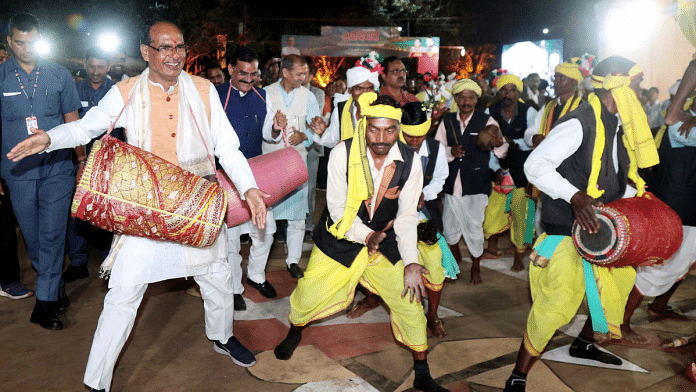New Delhi: Tribal votes played a significant role in deciding the victor of the four assembly polls in Madhya Pradesh, Rajasthan, Chhattisgarh and Telangana. Out of the 113 Scheduled Tribe (ST) — reserved seats across these four states, the Congress won 52 while the BJP cornered 53. Other parties together won 8 seats. In all the four states, the party which won the maximum number of ST seats won the election.
In the last assembly elections, the consolidation of the tribal vote had largely helped the Congress come to power in Madhya Pradesh, Rajasthan, and Chhattisgarh. In Telangana, the Congress and the Bharatiya Rashtra Samithi then the Telangana Rashtra Samithi) won an equal number of tribal seats.
While the Congress announced a slew of welfare schemes across the four states, the BJP, too, went big on its tribal outreach with President Droupadi Murmu’s elevation as the first tribal President being at the centre of its campaign.
Let’s look at the state-by-state distribution of these ST seats.
Tribals swing MP in BJP’s favour
Madhya Pradesh has 47 ST reserved seats. Tribal votes are also decisive in 40 general seats. As per the 2011 census, tribals form 21 percent of the population in the state. In 2018, the Congress won 30 ST-reserved seats, while the BJP won 16. In this election that trend has changed with the Congress winning 22 seats and the BJP securing 24 seats. The Bharat Adivasi Party secured one other ST reserved seat.
The BJP’s tribal outreach in Madhya Pradesh had begun last year, with President Murmu making a trip to the state and announcing the formulation of rules under the Panchayat Extension to Scheduled Areas (PESA) Act. The party also hailed tribal leaders like Birsa Munda to bolster its tribal outreach. In its manifesto, the BJP promised a budget of Rs 3 lakh crore for the development of tribals.
On its part, the Congress made three major promises for the tribals in the state. The first was the implementation of Sixth Schedule in the districts with over 50 percent tribal population, enactment of the PESA and hike in prices of tendu leaves from Rs 3,000 to Rs 4,000 per bag. The last promise, though first floated by the Congress, was later included by the BJP in its manifesto as well.
Congress loses tribal support in Chhattisgarh
Chhattisgarh has 29 ST-reserved seats. Of this, the Congress won 11 and the BJP wrested 17. Gondwana Gantantra Party secured one seat. There’s been a sharp fall in the Congress’ performance in tribal seats unlike the last assembly elections when it won 25 seats. The BJP won just 3 seats in that election.
Chhattisgarh has a tribal population of 31 percent. Taking cognizance of its performance the last time around, the BJP also used the Rashtriya Swayamsevak Sangh (RSS) machinery in the state to help with tribal outreach. Last year, Sangh chief Mohan Bhagwat made a four-day visit to the state during which he highlighted the religious conversions of STs.
BAP fails to make big impact
In 2018, the BJP won 9 out of the 25 ST-reserved seats in Rajasthan, while the Congress winning 12. Two ST seats each were won by the Bharatiya Tribal Party (BTP) and Independents. In this election, the Congress won 10 seats while the BJP cornered 12.
A split in the BTP led to the formation of the Bharatiya Adivasi Party (BAP) ahead of this state election, posing a challenge to both the BJP and the Congress in the tribal belt of southern Rajasthan. The BAP had fielded 27 candidates, of which 3 won, not causing significant losses to either the BJP or Congress.
ST voters favour Congress in Telangana
Of all the states, Telangana has the least number of ST-reserved seats at 12. Last time, the Congress (in alliance) won six and the ruling Bharat Rashtra Samithi (BRS) also won six. In the run up to the elections, the BRS government, in an attempt to woo tribal votes, increased reservation of STs to 10 percent. The Congress organised a leadership training programme in ST seats to train workers who could lead from the front and promised a 12 percent reservation quota if it came to power. In this election, the Congress won 9 ST seats while the BRS won 3.
(Edited by Tony Rai)
Also Read: 2 reasons why Congress & BJP might not succeed in wooing tribals in Madhya Pradesh



